Emerging technologies in business administration play a pivotal role in shaping the digital age we live in today. Staying updated with current trends in the business world is necessary to maintain a competitive edge. As we delve into the world of artificial intelligence, the Internet of Things (IoT), virtual reality, machine learning, and blockchain technology, it becomes evident that these technologies transform how business processes are executed.
Aloa, an expert in software outsourcing, understands the significance of harnessing these emerging technologies in business. Our extensive experience in software development, coupled with valuable insights into the application of AI, IoT devices, and blockchain technology, positions us as a trusted partner for businesses seeking to thrive in this digital era.
In this blog, we'll explore the top trends in emerging technologies in business administration for 2024. We'll investigate how these trends impact various industries and provide valuable insights into their use cases. Afterward, you will have a comprehensive understanding of the emerging technologies reshaping businesses' time-tested practices, helping business owners and industry leaders navigate the digital transformation and unlock the potential of a virtual environment integrated seamlessly into our physical worlds.
Let's get started!
Top 8 Emerging Technologies In Business Administration
Emerging technologies in business administration are transforming the digital landscape at an unprecedented pace. Staying updated with current trends in the business world is no longer a choice but a necessity for business leaders and owners. These technologies reshape organizations' operations, adapt to changing markets, and engage with customers.
Here, we present the top 10 statistics that provide insights into the impact and adoption of these cutting-edge technologies in the business world.
1. Generative AI
Generative AI, a cutting-edge technology in business administration, involves the creation of virtual content, designs, and even physical objects using artificial intelligence. It is driven by the growing trend of automation and the need for creative and personalized solutions in the digital world. Businesses are increasingly looking to harness generative AI to gain a competitive advantage and enhance customer experiences. Many companies are now exploring generative AI development services to integrate this technology into their operations and product offerings.
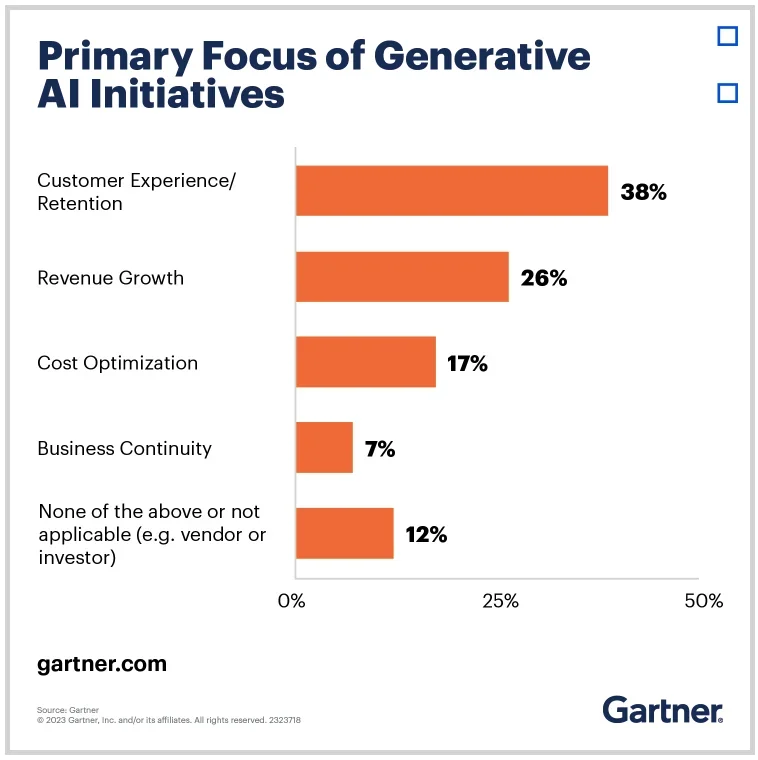
Generative AI offers advantages such as expedited product development, elevated customer satisfaction, and increased employee efficiency. However, the benefits vary depending on the specific application. Users must set realistic expectations for the value they aim to attain, especially when utilizing a service with significant limitations. Generative AI can generate inaccurate or biased results, necessitating human validation, which may offset time savings. Gartner advises aligning use cases with key performance indicators (KPIs) to guarantee that projects either enhance operational effectiveness or generate new revenue and improved experiences.
Why Generative AI Will Impact Business Administration
In the coming years, Generative AI is set to have a profound impact on business administration for several reasons:
- Personalized Customer Experiences: Generative AI can create custom-tailored content, products, and recommendations, improving customer experience and engagement.
- Creative Solutions: Businesses can use Generative AI to generate designs, marketing materials, and even virtual replicas of physical objects, saving time and resources.
- Efficiency and Cost Savings: Companies can reduce operational costs and streamline workflows by automating content creation and design processes.
- Real-time Adaptation: Generative AI can quickly adapt to changing trends and customer preferences, ensuring businesses stay relevant.
- Data-Driven Insights: The technology can analyze data from various sources, such as social media and IoT sensors, providing valuable insights for informed decision-making.
Generative AI is poised to revolutionize business administration by offering personalized experiences, creative solutions, efficiency, real-time adaptation, and data-driven insights. As this technology continues to evolve, businesses that leverage Generative AI will gain a significant competitive advantage in the digital world of the coming years. Embracing this emerging technology can drive growth, enhance customer service, and optimize business practices.
2. Cloud Computing Technologies
Cloud computing technologies will be at the forefront of emerging technologies in business administration in 2024. This transformative approach involves delivering computing services, such as storage, servers, databases, networking, software, and more, over the Internet. The driving force behind the adoption of cloud computing lies in its ability to enhance scalability, flexibility, cost-efficiency, and accessibility for businesses of all sizes.
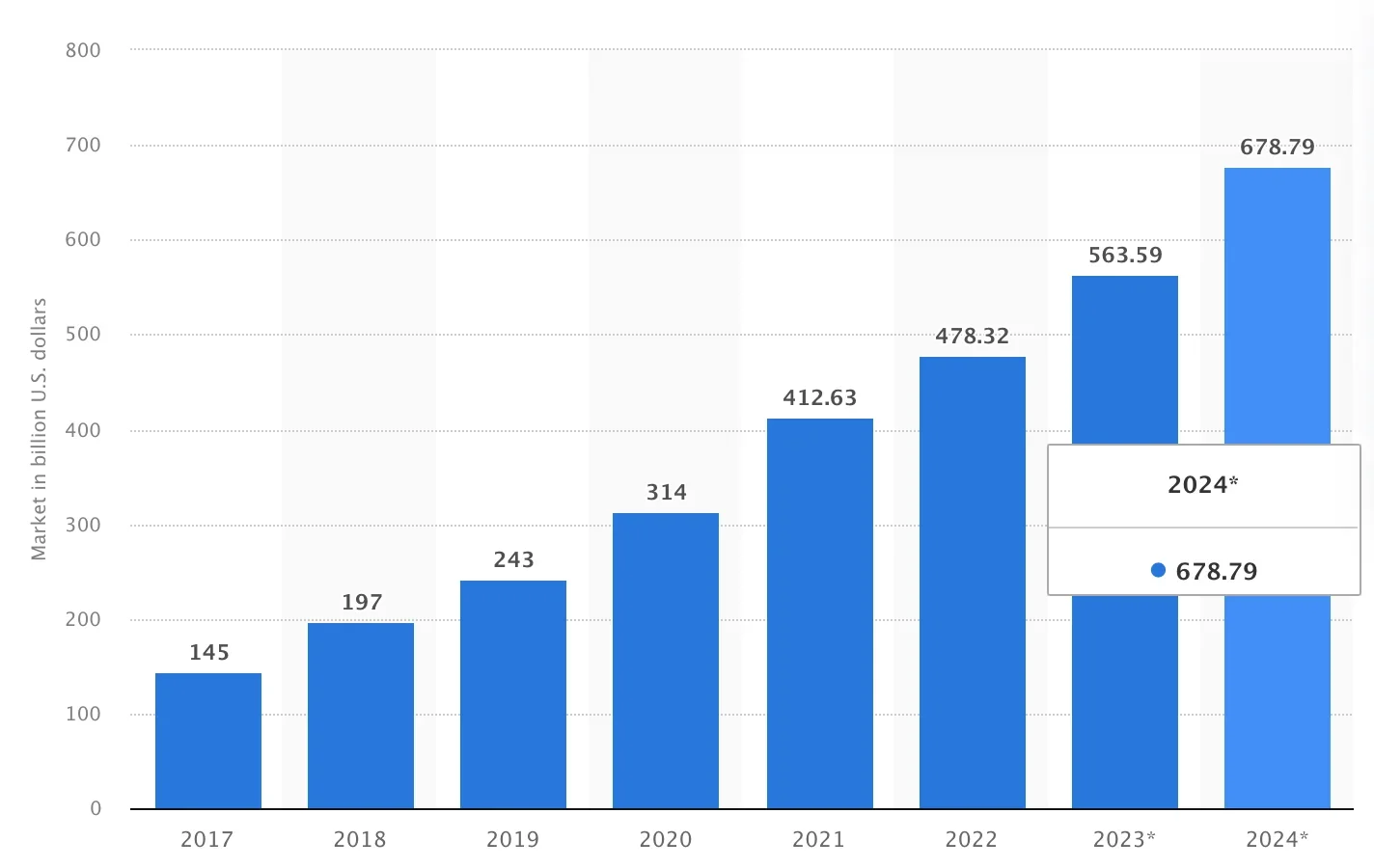
The global public cloud computing market is growing and is projected to reach approximately $679 billion by 2024. Professionals invested in staying ahead are taking cloud computing courses to understand intricate details of such prevailing technologies, equipping them better for future shifts. This market encompasses services like business processes, platforms, infrastructure, software, management, security, and advertising, all delivered through public cloud services. In this deployment model, known as a public cloud, computing services are provided via the Internet, with the underlying hardware shared among multiple companies. Customers can access services such as storage, bandwidth, and CPU cycles through this model.
Why Cloud Computing Will Impact Business Administration
In the rapidly evolving digital landscape, cloud computing is a pivotal trend for several reasons:
- Cost-Efficiency: Cloud computing allows businesses to reduce capital expenditures by eliminating the need for on-premises infrastructure. Instead, they pay for the resources they use, optimizing operational costs.
- Scalability: Scalability is a significant consideration. Businesses can scale their cloud resources up or down to accommodate fluctuating demands, ensuring efficient resource utilization.
- Accessibility and Remote Work: Cloud-based solutions enable remote work by providing access to critical business applications and data from anywhere with an internet connection. This supports the growing trend of remote work and employee flexibility.
- Enhanced Security: Cloud providers invest heavily in security measures, offering businesses robust data protection and compliance features that can be challenging to replicate on-premises.
- Competitive Advantage: Embracing cloud computing technologies allows businesses to stay agile, innovate faster, and respond quickly to market changes, granting them a competitive advantage.
Cloud computing technologies revolutionize business administration by offering cost-efficiency, scalability, accessibility, enhanced security, and a competitive edge. Embracing these technologies is crucial for businesses aiming to thrive in the dynamic landscape 2024. As the digital world continues to evolve, cloud computing remains a crucial driver of success for forward-thinking organizations.
3. Internet of Things (IoT)
The Internet of Things (IoT) is a cornerstone of emerging technologies in business administration in 2024. IoT refers to the interconnected network of physical devices, vehicles, appliances, and other objects embedded with sensors, software, and connectivity, enabling them to collect and exchange data. This technology reshapes how businesses operate, deliver services, and interact with customers.
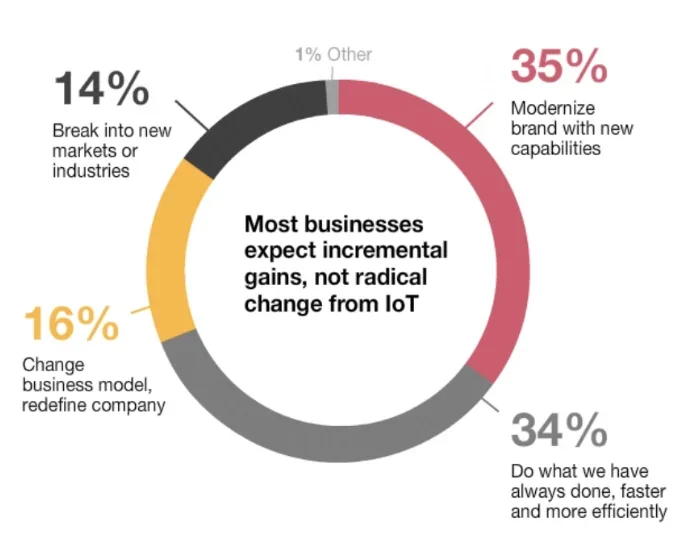
According to a survey conducted by PwC, the most significant advantages businesses have derived from adopting Internet of Things (IoT) technology are twofold. Specifically, 35% of respondents reported that they have gained new capabilities, while an additional 34% emphasized the notable enhancement in operational efficiency due to integrating IoT into their business practices.
Why IoT Will Impact Business Administration
IoT's significance in the business world is evident for several compelling reasons:
- Data-Driven Insights: IoT sensors generate a vast amount of data, offering businesses valuable insights into operations, customer behavior, and product performance. This data is a goldmine for making informed decisions.
- Enhanced Customer Experience: IoT allows businesses to create personalized customer experiences through data analytics. For example, retailers can offer tailored promotions based on real-time location data.
- Predictive Maintenance: IoT sensors can monitor the condition of machinery and equipment, predicting when maintenance is needed. This proactive approach minimizes downtime and reduces operational costs.
- Energy Efficiency: IoT devices can optimize energy consumption in facilities, making operations more environmentally friendly and cost-effective.
- Supply Chain Optimization: IoT-enabled supply chain monitoring ensures real-time tracking of goods, reducing inventory costs and improving delivery accuracy.
The Internet of Things (IoT) is poised to revolutionize business administration by providing data-driven insights, enhancing customer experiences, enabling predictive maintenance, promoting energy efficiency, and optimizing supply chains. Embracing IoT technologies is essential for businesses to stay competitive and leverage the power of data in the evolving business landscape of 2024. IoT will become increasingly integral to business strategies and operations as it matures.
4. Robotic Process Automation (RPA)
Robotic Process Automation (RPA) has emerged as a significant player in emerging technologies in business administration for 2024. This revolutionary technology uses software robots or bots to automate repetitive and rule-based tasks within business processes. When considering the implementation of RPA in business administration, it's essential to keep the following considerations in mind:
- Process Selection: Identify and prioritize repetitive and rule-based processes for automation. Not all processes are suitable candidates for RPA.
- Employee Training: Invest in training for employees who will work alongside RPA bots to ensure a smooth transition and maximize collaboration.
- Data Security: Implement robust security measures to safeguard sensitive information as RPA bots interact with various systems and applications.
- Continuous Monitoring: Regularly monitor and evaluate RPA processes to identify areas for improvement and optimization.
.webp)
A remarkable finding highlights the undeniable effectiveness of Robotic Process Automation (RPA). A significant 70% of companies report substantial time savings upon implementing this advanced technology. This compelling statistic instills confidence in readers and vividly illustrates the streamlined workflow benefits that RPA can deliver.
Why RPA Will Impact Business Administration
RPA is poised to make a profound impact on business administration for several compelling reasons:
- Efficiency Enhancement: RPA streamlines operations by handling routine tasks, freeing up employees to focus on more strategic and creative activities. This increased efficiency leads to improved productivity.
- Error Reduction: Robots perform tasks with remarkable accuracy, reducing the likelihood of human errors. This enhances data accuracy and ensures consistent outcomes.
- Cost Savings: RPA reduces operational costs by minimizing the need for human intervention in repetitive processes. It eliminates the need for an additional workforce and allows companies to do more with less.
- Enhanced Customer Service: By automating processes related to customer service, businesses can provide quicker response times, improved customer experiences, and 24/7 availability, ultimately enhancing customer satisfaction.
- Scalability: RPA is highly scalable, allowing businesses to seamlessly adapt to changing workloads and requirements. It can handle increasing volumes of work without a proportional increase in resources.
Robotic Process Automation (RPA) is set to revolutionize business administration by enhancing efficiency, reducing errors, cutting costs, improving customer service, and providing scalability. Embracing RPA with careful consideration of implementation is critical to staying ahead in the dynamic business landscape of 2024. As businesses evolve and adapt to the digital world, RPA remains a powerful tool for optimizing operations and gaining a competitive edge.
5. Virtual and Augmented Reality (VR/AR)
In emerging technologies in business administration, Virtual and Augmented Reality (VR/AR) have emerged as transformative tools. VR immerses users in a computer-generated environment, while AR overlays digital information onto the real world. These technologies are driven by enhancing customer experiences, improving employee training, and increasing operational efficiency.
.webp)
Based on Statista's projections for 2024, the primary applications of AR/VR will be in VR gaming, VR video/features, and VR gaming, with a combined market value of $17.6 billion, categorized under entertainment and games.
VR frequently applies to corporate training, particularly complex machinery and equipment scenarios. This mitigates the costly disruption caused by taking them offline for training. Meanwhile, AR boosts operational efficiency, offering features like 'see what I see' remote assistance and data overlay on the real world.
Why VR/AR Will Impact Business Administration
Several factors drive the integration of VR/AR in business administration:
- Enhanced Customer Engagement: VR/AR offers immersive product demonstrations and interactive experiences, leading to improved customer engagement and conversion rates.
- Efficient Employee Training: Businesses leverage VR/AR for employee training, providing realistic simulations and reducing the time required for onboarding.
- Streamlined Operations: AR assists in real-time data visualization and remote maintenance in industries like manufacturing and logistics, enhancing operational efficiency.
- Competitive Advantage: Adopting VR/AR can give businesses a competitive edge by providing innovative solutions that stand out in the market.
- Cost Savings: VR/AR can reduce travel and training costs, making it a cost-effective solution for businesses.
Virtual and Augmented Reality are poised to revolutionize Business Administration by enhancing customer engagement, streamlining operations, and providing a competitive advantage. Businesses should consider these technologies as essential tools for staying ahead in the fast-paced world of emerging technologies in business administration in 2024.
6. 5G Technology
5G technology, within the realm of emerging technologies in business administration for 2024, refers to the fifth generation of wireless cellular networks that promises to revolutionize connectivity. It represents a significant leap from its predecessors, offering faster data transfer speeds, lower latency, and increased capacity. The driving force behind 5G's impact on business administration is its ability to enable seamless communication and data exchange. With 5G, businesses can leverage real-time data analytics, remote work capabilities, and IoT sensors more effectively than ever.
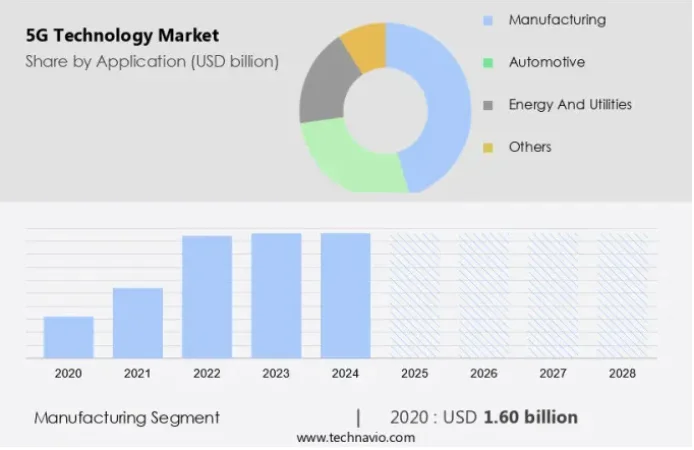
5G technology empowers 5G network manufacturers to establish smart factories, leveraging technologies like AI, automation, augmented reality for issue resolution, and the Internet of Things (IoT). It opens doors for manufacturers to tap into new revenue sources, particularly in the manufacturing sector, which plays a pivotal role in operator revenues by driving industry digitalization through 5G technologies.
Why 5G Will Impact Business Administration
5G technology will significantly impact business administration in 2024. Its rapid data speeds and connectivity will reshape industries and enhance customer experiences.
- Enhanced Connectivity: 5G provides businesses with ultra-fast and reliable internet connectivity, ensuring that data-intensive tasks and applications run smoothly, thus enhancing operational efficiency.
- IoT Advancements: The increased capacity and reduced latency of 5G facilitate the widespread deployment of IoT sensors. This empowers businesses to gather real-time data for predictive maintenance, improving customer experiences and reducing operational costs.
- Remote Work Optimization: 5G supports seamless remote work, allowing employees to access company resources and collaborate from anywhere. This boosts flexibility and productivity while reducing the need for physical office space.
- Competitive Advantage: Businesses that adopt 5G technology gain a competitive edge by staying ahead in the digital transformation race. Faster decision-making and improved customer service contribute to overall success.
- Considerations: While 5G offers tremendous potential, businesses must also consider cybersecurity challenges and the need for infrastructure upgrades to harness its capabilities thoroughly.
5G technology can impact business administration by enhancing connectivity, enabling IoT advancements, optimizing remote work, and providing a competitive advantage. Businesses should carefully consider its implementation to leverage its full potential in the ever-evolving landscape of emerging technologies in business administration for 2024.
7. Blockchain
Blockchain technology, an integral part of emerging technologies in business administration, represents a decentralized and secure ledger system that offers transparency and immutability. It is a driving force behind digital transformation, promising to revolutionize various industries. Implementing blockchain requires careful consideration to harness its full potential.
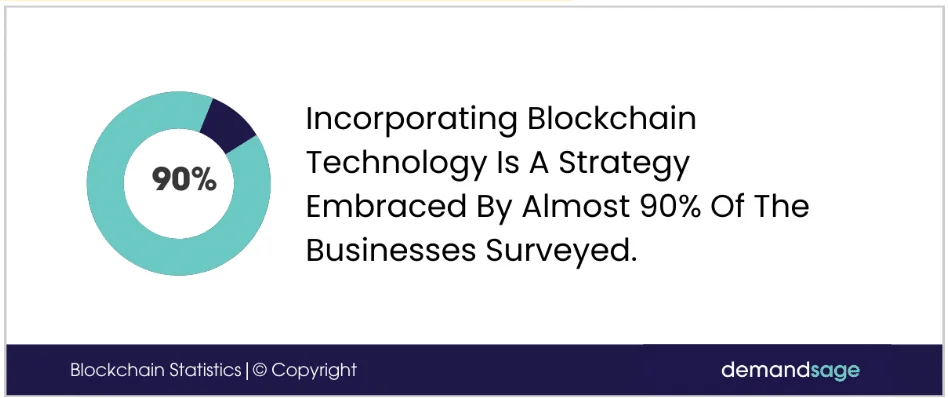
According to Coin Telegraph, nearly 90% of the surveyed businesses have implemented blockchain technology to varying degrees, with nearly the same percentage planning further investments in blockchain in 2024. Among those already utilizing this technology, 42% have experienced enhanced security features, while an equal percentage have found value in its copy protection capabilities.
Why Blockchain Will Impact Business Administration
Blockchain's disruptive potential lies in its ability to enhance security, transparency, and efficiency in business processes. Here are five key reasons blockchain will significantly impact business administration in 2024:
- Enhanced Security: Blockchain's cryptographic nature makes data tamper-proof, reducing the risk of fraud and unauthorized access.
- Transparency and Trust: The technology offers transparent, real-time data sharing, fostering stakeholder trust and ensuring accountability.
- Streamlined Supply Chain: Blockchain can optimize supply chain operations by providing end-to-end visibility, reducing delays, and minimizing errors.
- Smart Contracts: Automation through smart contracts simplifies complex agreements, reducing administrative overhead and ensuring contract compliance.
- Global Transactions: Blockchain facilitates secure, borderless transactions, eliminating intermediaries and reducing costs in international trade.
Blockchain technology is poised to disrupt and transform business administration in 2024. Its benefits include heightened security, transparency, and efficiency, making it a valuable asset for businesses seeking a competitive edge. Embracing blockchain and understanding its potential applications can pave the way for innovation and growth in the digital age.
8. Cybersecurity Technologies
Cybersecurity technologies are pivotal in safeguarding sensitive information and maintaining customers' trust. These technologies are a proactive defense against evolving cyber threats and breaches. The driving force behind adopting cybersecurity technologies is the increasing digitization of business operations and the growing complexity of cyberattacks.
.webp)
By 2024, we can anticipate significant shifts in privacy regulations, human-centric cybersecurity approaches, and the challenges associated with cyber risk quantification. Additionally, the role of cybersecurity leaders is set to undergo substantial changes while the importance of cybersecurity expertise at the board level continues to rise. Further, the utilization of threat detection, the emergence of zero-trust programs, and the implications of AI and IoT vulnerabilities will shape the cybersecurity landscape in the coming years.
Why Cybersecurity Technologies Will Impact Business Administration
As businesses increasingly rely on digital processes and data storage, the risk of cyber threats becomes more significant. Cybersecurity technologies are crucial for the following reasons:
- Protection of Customer Data: Cybersecurity technologies ensure this data's confidentiality, integrity, and availability, enhancing customer trust and loyalty.
- Prevention of Financial Loss: Implementing robust cybersecurity measures mitigates these data breaches, ransom payments, and operational disruptions and protects the bottom line.
- Legal and Regulatory Compliance: Many industries are subject to strict zero trust data protection regulations. Failure to comply can lead to hefty fines and damage a business's reputation.
- Safeguarding Intellectual Property: Businesses invest in innovation and intellectual property. Cybersecurity technologies prevent theft and unauthorized access to these valuable assets.
- Business Continuity: Cybersecurity technologies contribute to business continuity by minimizing downtime during an attack, ensuring operations continue smoothly.
Cybersecurity technologies will be crucial in business administration in 2024. They provide a robust defense against the ever-evolving landscape of cyber threats, protecting customer data, financial assets, and business reputation. To thrive in this digital age, businesses must prioritize the implementation of cybersecurity technologies as a proactive measure to safeguard their operations and customer trust.
How to Stay Ahead of the Curve In Emerging Technologies In Business Trends
Staying ahead of emerging technologies is crucial for maintaining a competitive edge. Here are some strategies to navigate the dynamic realm of emerging technologies in business in 2024.
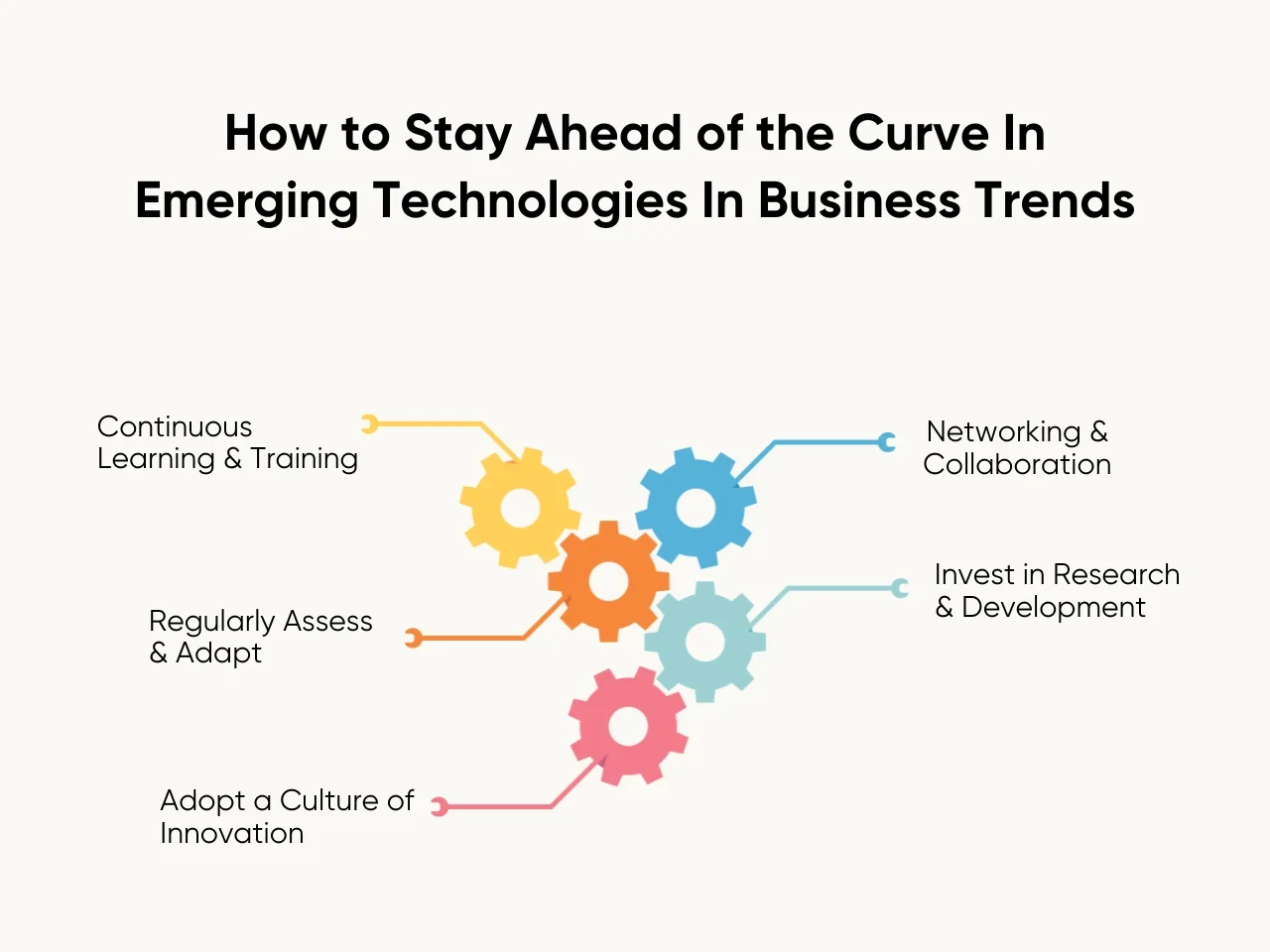
Continuous Learning and Training
Embracing emerging technologies requires a well-versed workforce in the latest advancements. Invest in continuous learning and training programs to equip your employees with the skills and knowledge to harness these technologies effectively. From machine learning to cybersecurity, providing ongoing education ensures your team remains at the forefront of industry trends.
Networking and Collaboration
Building a robust network within your industry is invaluable. Attend conferences, join professional associations, and engage with peers and organizations that share your interest in emerging technologies in business. Collaboration often leads to valuable insights, access to cutting-edge resources, and potential partnerships that can keep your business competitive.
Invest in Research and Development (R&D)
To stay ahead of the curve, allocate resources to R&D projects focused on emerging technologies. You can develop groundbreaking solutions or products that set your business apart by actively participating in research or partnering with innovators. R&D investments are instrumental in maintaining a technological edge.
Adopt a Culture of Innovation
Encourage a culture of innovation within your organization. Create an environment where employees feel empowered to propose and experiment with new technologies. Regular brainstorming sessions and innovation hubs can lead to creative ideas that enhance business processes and customer experiences.
Regularly Assess and Adapt
The pace of technological change demands that businesses regularly assess their technology stack and operational practices. Be prepared to adapt swiftly as new trends emerge. Monitor the competitive landscape, evaluate the relevance of your current technology solutions, and be open to making strategic adjustments when necessary.
Key Takeaway
Incorporating top emerging technology trends and staying ahead of the curve in emerging technologies in business administration is imperative for adapting to these trends and achieving business success. As the digital world continues to evolve, businesses must harness the power of emerging technologies to remain competitive and relevant in the market.
To harness these trends, businesses must stay informed and adapt swiftly. By embracing these technologies strategically, companies can reduce operational costs, optimize their value chain, and improve customer experiences, ultimately securing their competitive advantage.
For further insights and assistance in navigating the evolving landscape of emerging technologies in business, don't hesitate to contact Aloa at [email protected]. Stay ahead in the world of emerging technologies for business success.

